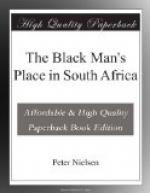But if good and ample land can be set aside in the various territories of spacious South Africa in which the Natives can live and move without let or hindrance; in which they can do what work they like for themselves and for their own people; in which they can engage, according to their individual desires, in all kinds of trades and commerce without the prohibition of the white man’s colour-bar; in which they can earn the wages that are governed by the laws of supply and demand only; in which they can build up after their own fashion courts of law and political councils for themselves; in which, in fine they can live and work out their own salvation, unhurried and unworried by strange and impatient masters, then, surely, the Natives of South Africa will have gained a great gain, far greater than any they can ever hope to win by pitting their undeveloped strength against the organised resistance of the whites.
The policy of territorial separation, which is now part of the law of the Union of South Africa,[27] is the only policy that will make possible a home existence for the Natives in their own homeland, for we know that, however educated and however worthy the civilised Native may become, he cannot hope to find a home, or to feel at home, among the whites. Rightly or wrongly, the whites have banged, bolted and barred their doors against the blacks, and neither moral worth nor educational qualifications will serve to open them. But in their own areas the Natives will have their own homes and their own home-life, without which human existence is indeed miserable. Those among them who long for the privilege of private ownership will be able to acquire land in freehold in localities set aside therefor, while those who cling to the old ways will be allowed to continue as before under their old system of communal land tenure.
With freedom of movement and action under a minimum of European supervision and control the Natives will, in their own areas, have full opportunity and scope for the development of a home-civilisation of their own along lines similar to, if not identical with, those by which the Europeans follow their separate ways. It is a heroic plan, and it will demand great sacrifice from both peoples, but who can doubt that the end will be worth the effort? The Natives may in some places have to leave the land where their ancestors are buried, and the whites will, in many places, have to accept the price of expropriation for land and houses hallowed and made precious by effort and memories, but the great general gain at the end will undoubtedly be worth all that must be surrendered now. This policy is the only one that holds out hope of peace and happiness for both races. If the fears and objections that are being raised by a few Natives and by individual Europeans here and there are allowed to frustrate this, the only practical plan so far devised, the future generations of both white and black in South Africa will assuredly curse the day their fathers wavered and failed to make the only just and fair provision that could be made.




